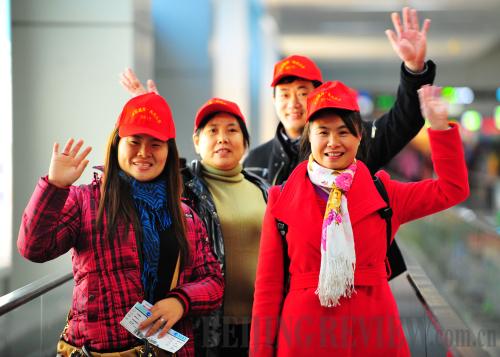|
 |
|
GLORIOUS RETURN: Migrant workers in Fuzhou, Fujian Province, make their way through an airport terminal on January 14. They were rewarded with free flights back to their hometowns for family reunions during the Chinese Lunar New Year (WEI PEIQUAN) |
Another survey in more than 20 cities conducted by Beijing-based Outlook Weekly showed that 85 percent of young migrant workers never worked on farms and only 8.9 percent would like to return to rural areas in the future.
In the meantime, young migrant workers find that it is not very easy to become bona fide urbanites.
The survey conducted by China Youth Daily revealed that young migrant workers faced some major obstacles to integration in cities. Seventy-three percent of the respondents reported that their biggest problem was high cost of living.
In addition, up to half of young migrant workers complained about a lack of cultural activities, unequal pay, difficulty in finding jobs, disrespect and unpaid salaries.
Approximately one third of them said that they were concerned with their own inability to take care of their parents, the difficulty in getting social security coverage and unequal access to education for their children.
While reading between the lines of Hu's report, Yan Wenjing, a Party congress delegate from Zhongshan, southern Guangdong Province, noticed a change concerning migrant workers compared with five years ago.
"The report emphasizes in the part on educational development to ensure that children of rural migrant workers in cities have equal access to education," she said, adding that the report to the 17th CPC National Congress in 2007 only pledges equal access to compulsory education for children of migrant workers.
Yan said that this suggested children of migrant workers would not only be able to receive compulsory primary education in the cities where their parents work, but also pre-school and high school.
"This accurately responds to the suggestions that I heard from fellow migrant workers," Yan said.
After being elected as a delegate to the 18th CPC National Congress, Yan visited 70 communities in Zhongshan and collected more than 1,000 questionnaires from migrant workers. She said that the lack of equal access to education for their children was the problem most complained about by the respondents.
New hope
"The government is working hard to safeguard migrant workers' rights and interests in 10 respects," said Vice Minister Yang at the press conference.
Yang said that the government strives to ensure migrant workers to be able to find jobs in cities, sign labor contracts with employers, receive job-related training, and be paid for their efforts. "They should have access to social insurance, better accommodation, legal services to protect their rights and cultural activities, their children should have access to education, and they should be able to pursue their goals," he said.
Despite a government requirement for employers to sign labor contracts with migrant workers and pay for insurance, many migrant workers are still not properly covered.
Data from the National Bureau of Statistics show that in the year 2011, only 43.8 percent of migrant workers had signed labor contracts with their employers, and coverage of pension, work injury, health, unemployment and maternity insurance lagged at 13.9 percent, 23.6 percent, 16.7 percent, 8 percent and 5.6 percent, respectively.
The government requires employers to pay for insurance policies such as those covering work injury and unemployment, whereas pension and health insurance are to be jointly paid by workers and employers. But some migrant workers are reluctant to pay the premiums which are relatively high in comparison to their low and unstable incomes. A number of employers, too, would rather avoid paying social insurance to cut costs.
Li Shi, Executive President of the China Institute for Income Distribution at Beijing Normal University, said that migrant workers often move from city to city, whereas currently the insurance benefits are not readily carried over to other provinces and municipalities, which to some extent reduces migrant workers' incentive to pay into the system. Li suggested setting up a separate and transferable social insurance system for migrant workers besides increasing benefits.
Yang emphasized that the government is making efforts to train most migrant workers into technical workers, and turn qualified migrant workers into new urban residents.
Email us at: wanghairong@bjreview.com | 